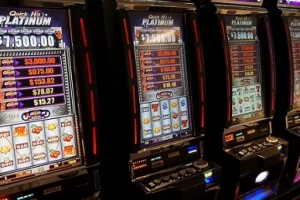How Does a Casino Jackpot Work?

If you’re a slots fan, you know the thrill of hitting a big jackpot. You might also have heard about the different types of jackpots and how they work.
Progressive jackpots are a popular part of the casino experience, and can be found at most casinos. They get larger as players play and accumulate over time.
Jackpots
Jackpots are prize pools that can be won in a variety of casino games. They can be found in slot machines and video slots, as well as in poker games.
A jackpot can also be a feature of some roulette and baccarat games. These jackpots can be large, making them popular among players.
There are two main types of jackpots: fixed and progressive. The latter type is more common, as it continuously grows until someone wins it.
In a progressive jackpot, each time a player wagers on the game, a small percentage of their bet goes directly to the jackpot pool. These pools are often shared by a number of casinos.
Payout percentages
Payout percentages are a crucial part of casino gambling. They determine how much money a player can win from a particular slot machine.
The payout percentage is often called the Return to Player (RTP) percentage. It’s calculated by comparing how much money is wagered against how much the machine pays out.
It’s important to note that these numbers are theoretical, and are based on millions of spins.
They are also influenced by the popularity of a specific machine. For instance, if a slot is played more frequently than others, it’s going to have a higher payout percentage.
Taxes
If you win a casino jackpot, the IRS expects you to report it as income on your tax return. This includes winnings from a slot machine or a table game, office pools and lottery games.
The IRS taxes gambling winnings at 25% of the total amount. It also taxes any winnings at horse races, lotteries or off-track betting.
Currently, when a slot machine jackpot of $1,200 or more is won, the machine is temporarily taken out of service until the person fills out a W-2G form and pays federal taxes on their winnings.
The bill introduced Thursday would update the threshold to $5,000 and allow for future increases based on inflation. It also requires casinos to take fewer slot machines out of service while people fill out forms and pay taxes.
Regulations
The gambling industry and its allies in Congress are renewing a push to decrease the number of slot machine jackpots reported to the IRS. Currently, when a casino patron wins a slot machine jackpot of $1,200 or more, the machine is temporarily taken out of service while the winning customer completes a W-2G tax reporting form.
The Congressional Gaming Caucus is adamant that a more streamlined regulatory process will reduce the number of one-off jackpots while also reducing a casino operator’s overall tax burden. That’s where the SLOT Act comes in. The bill is a bipartisan effort led by Nevada’s Dina Titus and Pennsylvania’s Guy Reschenthaler. Using the latest in statistical analysis and a bit of mathematics, they determined that raising the jackpot-triggering threshold to a more modest $5,000 would likely be the most efficient way to accomplish their mission.
Legality
Legality is the ability of an act, agreement or contract to be enforced by law. It also refers to if a behavior is legal or illegal in a given jurisdiction. This word traces back to the Latin word legalis, meaning law.
In the United States, slot machine jackpots of $1,200 or more are subject to an IRS report. This is due to the fact that casinos are required to issue a W-2G tax form when a jackpot exceeds this threshold. However, new bipartisan legislation introduced Thursday by Congressional Gaming Caucus Co-Chairs Dina Titus (D-Nevada) and Guy Reschenthaler (R-Pennsylvania) would raise the jackpot tax reporting threshold to $5,000. This is a 300% increase over the previous threshold. The bill has been approved by the Senate and is currently awaiting President Obama’s signature.
